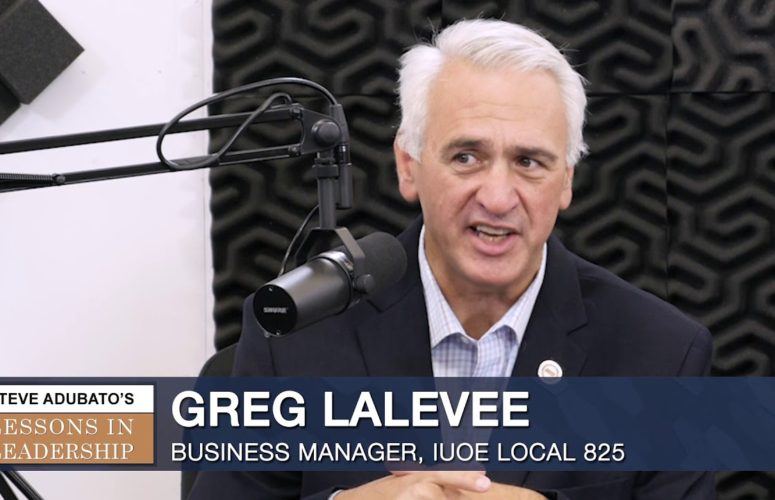
Gauging New Jersey’s Economic Future
NJBIA event reveals what’s in store for businesses in 2015.
By Anthony Birritteri, Editor-in-Chief On Mar 9, 2015Lt. Governor Kim Guadagno, state legislators, business leaders, economists and other professionals discussed their ‘visions for a better business climate’ at the New Jersey Business & Industry Association’s (NJBIA) recent Public Policy Forum. The day-long event, held at the Sheraton Edison Hotel, was a “meeting of the minds,” as Matt Wright, NJBIA chairman, described the forum in his opening remarks.
It was a day in which state legislators were goaded by energetic moderator Steve Adubato of “Caucus NJ” and “NJ Capitol Report” on pending issues such as the Transportation Trust Fund (and the related question of raising the gas tax), paid sick leave and the state pension system. Meanwhile, in an economic panel discussion moderated by NJM Insurance Company President and CEO Bernie Flynn, business leaders discussed New Jersey’s banking, accounting, legal, real estate and construction climates.
The day was best summed up by Lt. Governor Kim Guadagno, whose keynote address focused on the results of a recent Monmouth University survey which revealed that 50 percent of New Jersey residents would leave the state within the next five years if they had the chance. The survey results were “totally unacceptable,” Guadagno said. “There are too many of us saying we are ‘gone’ when our children move out of the house; too many of us saying we are ‘gone’ when we retire; too many of us saying we can’t afford to live here. … That has to change.”
Meanwhile, she detailed the positive aspects of the state’s economy, such as an unemployment rate that decreased from nearly 10 percent (in 2009) to 6.4 percent in November 2014, and the creation of 143,000 private-sector jobs since the end of the recession. Guadagno also said that the state’s Economic Opportunity Act was a game changer and resulted in, for example, the Philadelphia 76ers moving its corporate offices to Camden and Subaru of America relocating its corporate headquarters to the city.
Though this news is good, the state is not progressing fast enough, the Lt. Governor said.
“We have to keep fighting,” she avered.
She added that Trenton is not broken, and that legislators – even if they represent different parties – have one common interest in mind: “That is you … the businesses, the communities, the families, the residents of the state. At the end of the day, we have to move forward in a way that makes business people happy. … We know that if we increase taxes on you, you have a choice. … You can move across the river … you can move somewhere else.”
Roundtable Discussion on NJBIA’s Business Outlook Survey
NJBIA President Michele Siekerka presented the results of the association’s 2015 Business Outlook Survey. Known as the leading indicator of how the state’s economy will fare in the new year, some 1,046 NJBIA member companies, 75 percent of which are small businesses with fewer than 25 employees, responded to the survey. According to Siekerka, companies are positive, yet cautious, about the economy heading into 2015. They feel the state is moving in the right direction with continued economic improvement, and they foresee growth in their own sales, profits and employment. However, “they are also cautious because of regulatory uncertainty, the tax climate, divided government and the inevitability of another [difficult] budget cycle,” Siekerka explained.
Of main concern to businesses is the continuing impact of the Affordable Care Act. “It remains unpopular among member companies, with 59 percent of respondents saying federal healthcare reform is having a negative impact on their businesses. Eighty-five percent expect employee benefit costs to rise,” Siekerka said.
“Another major concern is the tax climate in the state. We have among the highest income, corporate and property taxes in the nation. We cannot stay competitive with our neighboring states if our taxes continue to rise,” she said. New Jersey’s inheritance and estate taxes are also impacting people’s and businesses’ decisions on whether to stay or leave the state. According to the survey, and mirroring the Monmouth University poll, 50 percent of companies revealed that the inheritance and estate taxes are playing a significant role concerning where their companies will continue to do business in the future.
Economist and session panelist Dr. James Hughes, dean of the Bloustein School of Planning & Public Policy at Rutgers University, underscored the severity of the situation by stating, “New Jersey is in a serious net out-migration position. Many of the migrants have indicated that those two taxes (inheritance and estate) have a very significant influence in their decisions to leave New Jersey when they retire.”
Panelist Jay Biggins, executive managing partner of Biggins, Lacy, Shapiro & Company, a location economics firm that helps companies make location decisions, added, “Entrepreneurs may find that New Jersey is a good place to start a business, but when it comes to monetizing on that effort, many are doing that in places like Florida and other income- and capital-gains-tax-free environments.”
That said, Biggins commented that businesses still find New Jersey attractive. “There is access to talent here and access to markets,” he said. Additionally, Northern New Jersey is benefitting from the inflow of businesses and jobs coming from Manhattan, an even higher-cost location. Adversely, in the southern portion of the state, businesses are being tempted to move to the low-cost border states of Delaware to the south and Pennsylvania to the west, where many of their existing employees live.
The state needs to create what Hughes called, “externally supported industries that are the platinum standard of economic development. These are the wealth creators that draw significant flows of dollars into the state, which in turn, support small businesses, consumer spending and the like.”
The best example of this, Hughes explained, was AT&T before its divestiture and the loss of its monopoly as a telecommunications giant. “At one time, AT&T provided long distance services to the rest of America, and 97 percent of AT&T’s revenues came from outside of New Jersey. That supported billions of dollars in payroll … up to 40,000 high paying jobs in the state. This [type of scenario] is where we should be aiming our economic development and any special incentive program that the state has,” he said.
Biggins referred to Subaru’s locating to Camden and keeping jobs in the state as a similar example. The company was approved for up to $117.8 million under the New Jersey Economic Development Authority’s GROW NJ program to establish its new headquarters and service/training center in Camden. The project involves the creation of 100 new jobs and the retention of 500 “at risk” jobs. Small businesses will benefit from Subaru’s decision in a number of ways: “Subaru will spend enormous amounts of money on vendors, on consultants and on its own employees. These employees will be spending money in stores and for services, so there is a multiplier effect,” Biggins said.
While the Subaru deal was an example of a big incentive package offered by the state, Biggins stressed that government is also helping small businesses with incentives. For example, the GROW NJ tax credit program can be used by small tech start-ups and manufacturing businesses that create 10 jobs and retain 25 jobs. And, these employment numbers can be lower if the business locates to a Garden State Growth Zone and in eight South Jersey counties (visit NJEDA.com for more information on Grow NJ).
Legislative Panel Discusses Key Business Issues
Moderator Steve Adubato had state legislators weaving, bobbing, jabbing and laughing during a discussion that touched upon funding solutions for the Transportation Trust Fund (TTF) and a statewide paid sick leave bill.
The state’s TTF, which is supported by a 14.5-cent per gallon tax (the second lowest gas tax in the nation) and other sources, will run out of money at the end of the 2015 fiscal year (June 30). The fund receives about $1.2 billion a year from constitutionally dedicated revenues, but that amount is equal to the state’s annual transportation debt service. Come July 1, that leaves no funds for road, rail and bridge projects.
All participating legislators on the panel were confident that a funding solution will be found. When Adubato asked the panelists when that might be, Jon Bramnick, Assembly Republican Leader, quipped, “Before there is an ultimate crisis.”
Senate President Stephen Sweeney said everyone in the State House is working together with the Christie Administration to try and find a solution, but he warned the audience, “There is no free ride because [the money] is going to come from somewhere. Whatever we do, it has to be constitutionally mandated … every single penny has to go towards transportation.”
Assembly Speaker Vincent Prieto said he has not been shy about raising the gas tax as a solution. “When you [consider] the price of gas and where it is now, it is sort of an easy thing [to do] … it is the low hanging fruit.”
Bramnick said that the state has to send a message that if it raises the gas tax, it should make sure another tax or taxes are proportionately lower. Why? “Because people are leaving or are thinking about leaving the state because of the tax climate,” he said.
Prieto responded that at the end of the day, the state needs a “net positive” in terms of money. For example, he said that getting rid of the estate tax would impact close to $400 million going into the state’s coffers. Since the TTF money is constitutionally mandated to go into the fund, the $400 million cut from the estate tax would leave an enormous hole in the budget.
Senate Republican Leader Thomas Kean, Jr. said the first thing the Legislature has to focus on is what is making people leave the state. “Whether it’s improving our roads or infrastructure or lowering the tax burden on people, we need to look at [everything] as a one-piece solution.”
Kean added that the most important thing that can be done immediately is dealing with the estate tax, because “it would send a message to people thinking about leaving the state.” The estate tax issue should also be coupled with an increase in the pension retirement tax’s qualifying level; from $20,000 to $30,000 (for couples), Kean said.
“We both agree in reducing the retirement tax,” Sweeney said. “New Jersey is actually one of the few states that does tax retirement income. Right now, the government is taxing almost 70 percent of people who retire in the state. To me, [fixing this] is first and foremost.” He also said that TTF and the retirement tax can be dealt with if the Legislature works together.
Concerning the issue of paid sick leave for all public- and private-sector employees in the state, as a handful of municipalities in the state are doing, Bramnick said that “in a perfect world, [paid sick leave] is conceptually great. However, in New Jersey, where we are already the most over-regulated, highest-taxed, anti-business climate state, we don’t need to impose more regulations on businesses.”
Prieto countered, “This is the right thing to do. Do you want employees to come in sick? Who have to come in to work or they can’t put food on the table? Who are not productive? Who are liable for getting other employees sick? Most people are doing it (providing paid sick leave). We just want to do it in a uniform way because municipalities have taken up this task.”
When Adubato asked if it is the role of government to tell business owners what they can and can’t do in managing their business, Prieto commented, “There is a quality of life issue here and we have a responsibility to create safety net programs so people are able to live better lives.”
Sweeney added, “We did paid family leave, it was the right thing to do and the sky didn’t fall and the world didn’t end. I will argue that the minimum wage increase didn’t hurt the economy, either.”
Adubato then took the issue to the audience.
NJBIA Chairman Matt Wright commented, “This is not the time for paid sick leave in New Jersey. We are trying to overcome a reputation as being an unfriendly place for businesses. Adding something like this right now is not good timing.”
Carol Stillwell, president of Stillwell-Hansen, Inc. an Edison-based company with 75 employees, said she got into business 45 years ago and has been treating her workers the way she would want to be treated. “My employees get sick leave whenever they need it. However, I don’t think that needs to be dictated by government. “
When Adubato asked about businesses owners who may not have the same kind of concern for employees as Stillwater, she responded: “Then they shouldn’t be in business. I believe the small business owner and the community of business owners are doing the right thing.”
Another business owner who runs an engineering company said he offers paid sick leave as part of his employee benefits package. However, if it becomes uniform throughout the state, he said he would then have to find another benefits expense to offer in order remain an employer of choice among his competitors. In other words, government would be changing the economics of recruiting and retention.
Economic Outlook Panel
Linda Bowden, New Jersey regional president, PNC Financial Services Group, Inc., commented on the economy and the state of the banking industry, saying that financial institutions are having a challenging time in a low interest rate environment. People are not putting money into CDs and typical depository vehicles, which are big money makers for banks, she said. There is also a cautious business community that is not taking out loans to grow their businesses. “PNC surveyed 2,000 small business owners and found that only 17 percent would probably or definitely take out a new loan or line of credit within the next six months. … So that is more than 80 percent who are not,” she said.
Banks therefore are looking for alternative forms of revenue producing products that generate fees, such as investments, trusts, treasury management and the capital markets.
Touching upon the regulatory environment, Bowden said the Dodd–Frank Wall Street Reform and Consumer Protection Act, which encompasses 398 rules, 94 of which have not been activated yet, is causing big banks to build huge departments dedicated to compliance. Small banks, meanwhile, are having a difficult time complying and that is why consolidation is occurring in the industry.
The exciting aspect of the industry, she said, is technology. “Five years ago, we had no idea what a smart phone could do for you. Five years from now, we have no idea what it can do to us,” Bowden said. “What does that mean? We cannot just look at the technology necessary for today. We have to make certain, strategically, where we anticipate technology to be in the future. From a business perspective, business owners want cash flow solutions that are more efficient and more profitable, and that is all based around technology,” she said.
Discussing the legal industry, Michael McBride, managing partner at Connell Foley LLP, compared the benefits of hiring a New Jersey-based law firm, versus a firm in New York or Philadelphia. Firms based in the state “tend to be more hands on and benefit from having a local presence. Our lawyers know people on the municipal, county and state levels, including the judicial system and business leaders,” he said.
In terms of legal work, McBride sees an increase in alternative dispute resolution (ADR) cases because “the court system today is not terribly efficient and there are many unknowns with litigation. To cope with the increase in ADR, Connell Foley has three former judges on staff who handle such cases … “that is all they do 24/7,” he said.
With a firm grasp on the real estate industry, McBride said residential development “along the Hudson County Gold Coast is doing well, as evidenced by the cranes dotting the Hudson River, especially in Jersey City, where 4,000 residential units should be coming on board in 2015.”
The industrial market saw an uptick in rents near the end of 2013 and beginning of 2014 in south, central and northern New Jersey, as demand for consumer goods increased. McBride pointed to Amazon’s warehouse facility in Robbinsville, which has created some 1,000 jobs. In addition, the company is leasing a 560,000 square-foot facility in Avenel for its growing grocery business, AmazonFresh, from which it makes deliveries to urban communities, including New York City.
McBride commented that the office market in the state is virtually flat with an average 25 percent vacancy rate, “unless you are on the Hudson Waterfront.” Because of the preferred lifestyles of Millennials, he said companies will be looking for locations with rail access to attract workers living in Jersey City, Hoboken and New York.
Brad Muniz, president of the New Jersey Society of CPAs (NJSCPA) and a partner at the firm of Sobel & Co, Livingston, detailed the results of an association survey asking what is on the minds of businesses throughout the state. The cost of labor was one answer, but Muniz said that while the increase in the minimum wage did not have an enormous impact on businesses, implementing the mandated cost of living adjustment did. “Add to that paid sick leave and businesses are saying that government is regulating the free markets,” he said.
“Healthcare costs also had a significant impact on the business community,” Muniz continued. “The Affordable Care Act sent people scrambling and changing benefit packages before and ever since the act went into effect. More importantly, it has affected employees because employers are pushing as much of the [healthcare] costs down [on workers] as they can.”
Again, the inheritance and estate tax came up as a major issue impacting business owners. In the NJSCPA survey, 80 percent of respondents reported they are thinking of leaving the state because of the estate tax. Additionally, Muniz said, “More than 70 percent of accountants are recommending that clients move out of the state to avoid the impact of these taxes. Additionally, 84 percent of CPAs feel these taxes impact the state’s middle class just as much as the affluent.
For instance, while the federal government raised the exemption of the estate tax to under $5 million, New Jersey’s stayed at under $675,000. “In New Jersey, we are not talking about wealthy tax payers being impacted,” said Muniz. “If you are a single individual and you own a home, more than half of your exemption would be eaten up. Throw in any life insurance or retirement plan you may have and you will see that middle to lower middle income people are being effected.”
More than 175 people attended NJBIA’s Public Policy Forum, a comprehensive event that informed attendees about the status of the state’s economy and the challenges legislative and businesses leaders face in creating a more business-friendly environment.
Related Articles:






